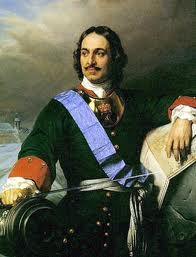Have you ever heard of Peter the Great? If so, you probably know he was the Russian emperor (tsar) from 1682 until 1725. He got his nickname The Great not only for his impressive physique, but also since under his reign the Russian Empire became very prosperous. He founded Saint Petersburg, which became an important city in oversea trading with the Western European countries and reformed the army, the church and education. Science was flourishing and Russia became a world superpower. However the thing that really made Peter great was the founding of the ‘All Joking, All Drunken Synod of Fools and Jesters’. A club of noblemen who’s duties were mostly drinking and partying.
When Peter founded this elite club (that actually was known under many different names) in 1692 he was just 18 years old. But already in this young age he understood that drinking and partying were a necessary distraction from his important work. He and his friends already had a certain reputation in this fields, since as a teenager he used to travel into the countryside with a group under the name The Jolly Company. This travelling gang of 100 to 200 party animals turned to noblemen to give them shelter, food and of course many alcoholic beverages. For more details on the drinking behavior of Peter and his friends we suggest you to read .
As time passed by Peter gave many of his friends official titles and so the Jolly Company got a more official character under the new name All Joking, All Drunken Synod of Fools and Jesters. Nikita Zotov, one of Peters lifelong friends, was name king-pope and from than on lead the ceremonies of the Synod. There was also a college of cardinals, bishops and more of these church related titles. This lead to huge criticism from the Russian-Orthodox church and it’s believers. Some people even went as far as saying this was proof that Peter was the Antichrist.
But when Peter stated he wasn’t mocking the Orthodox church, but his club was more a parody to the Catholic church most Russians stopped caring. And so the tsar and his friends partied until his death in 1725. Not as much in the countryside anymore, but usually in the house of Franz Lefort, a military officer from Swiss origin. Peter even gave Lefort a mansion with a huge dining hall in Moscow, a place for 1.500 people that functioned as a clubhouse.
So what can we conclude from this story? Just like some of the quotes and sayings on this site by some of the greatest minds on this planet, this is a great example of how large consumption of alcohol didn’t seem to slow down yet another man in his rise for power. From the scientific research in the wild nature of Siberia and Kamchatka, to the oversea trading and the reforming of almost every institution in the Russian Empire, it was all done by a man who understood the importance of getting totally hammered from time to time.
Micky Bumbar

thats a Great Story 🙂
LikeLike
I didn’t know he started something called a “All Joking, All Drunken Synod of Fools and Jesters”.
By the way I know about Protestants, Roman Catholics and the Greek Orthodox churches in the world (and I assumed Russia had the Greek Orthodox Churches). But when you mention Russian Orthodox, I wonder if there is another group of Christianity that I’m not aware of, or were your referring to the GOC as the ROC.
By the way, is it funny that me being a person who doesn’t actually enjoy drinking seems to enjoy your blog. Ha!!
I’m not anti-alcohol, I love desserts with alcohol in them, but I never enjoyed drinking.
LikeLike
Hahaha I am glad that you do enjoy it! Well, the Orthodox church is slightly different than the Catholic one. Since centuries there were multiple patriarchates, the most important being always in Constantinople (nowadays Istanbul).
For a country it was very important to have your own patriarchate since it created a solid base for a sovereign state. Like an own language or alphabet.
Bulgaria is a nice example, when it was sometimes under ruleof the Byzantine Empire and sometimes independent. Having a Bulgarian Orthodox Church was something they always aimed for, but was only granted after defeating the Byzantines in battle. Politics, politics…
Right now there are patriarchates in Jerusalem, Alexandria, Antioch, Russia, Georgia, Serbia, Bulgaria, Cyprus, Greece, Albania, Poland and ‘Czech land and Slovakia’.
LikeLike
Thanks for the elongated explanation.
Yes, I’m aware that the Catholic and the Orthodox churches are two different entities. All I really wanted to know was whether there was a difference within the Orthodox churches (Russian & Greek).
But thanks once again for delving so deep. It was really insightful.
I studied about ‘Peter The Great’ in school when I was kid, but that was over twenty years ago.
LikeLike
Oh nice! Yes he did quite a lot for Russia and still managed to find time for his drinking haha
LikeLike
Pingback: Pyotr Tchaikovsky, a brilliant drunkard who died from drinking water | Lords of the Drinks
Reblogged this on Whatever, who cares… and commented:
Cheers! 🙂
LikeLike
Cool! 🙂
LikeLiked by 1 person
Glad you liked it and even reblogged it Tanja. Cheers,
Micky
LikeLiked by 1 person
Pingback:
Pingback: